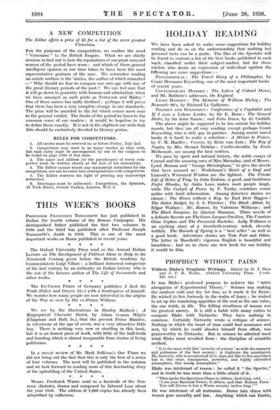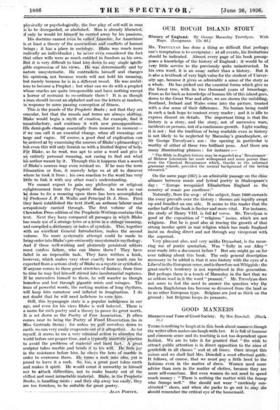PROPHECY WITHOUT PAINS
IT was Blake's professed purpose to achieve the " intire abrogation of Experimental Theory." Science was. making the rainbow cold and dry for him, as it made it for Keats: He wished 'to live furiously in the realm of fancy ; he wished
to set up the wandering appetites of the soul as the one values the one truth, in life. The killing steadiness of reason was his greatest enemy. It is still a, habit with many critics to compare Blake with Nietzsche. They have nothing in common. Certainly Nietzsche wrote a critique of science.
Nothing in which the heart of man could find assurance and rest, by which he could absolve himself from, effort, was
praiseworthy to Nietzsche. But in science he admired most what Blake most revolted from : the discipline of scientific method.
" It is the same with this severity of science ' as with the manners and politeness of the best society : it frightens the uninitiated. He; however, who is accustomed to it, does not like to live anywhere but in this clear, transparent, powerful, and highly electrified atmosphere; this manly atmosphere." - -
Blake was intolerant of reason : he called it " the Spectre," and in truth he _Was more than- a-little, afraid of it.. t
" Then spoke the Speetrous Chaos to-Albion, dark'ning, cold. . . . ' I am your Rational Power, 0 Albion, and that Human Form
You call Divine is but a Worm seventy inches long !' " . .
Ile was intolerant of all restraints. Down into chaos with
.
reason goes morality and law. , -Anything which can hinder,
physically or-psychologically, the free play.-of self-will in man is to be disregarded, or abolished. Man is already liberated,' if only he would let himself be carried away by his passions. 'His doctrine cannot even be called'Ailarchic, for Anarchism' is at least a theory of the associations and conflicts of human beings ; it has a place in sociology, - Blake was much more radically an individualist ; he never eiien, considered the fact that other wills were as much entitled to freedom as his own.
But it is very difficult to bind him down to any single *taligilde expression of his .views. _ He Va.' determinedly and by nature unsystematic. He contradicts himself and changeS his opinions, not because words will not hold his meaning; but merely because he is in a different mood. He was ambit= ions to become a Prophet ; but what can we do with a prophet whose oracles are qiiite irresponsible and have nothing except a horror of restraint to co-ordinate them ? It is as though a man should invent an alphabet and use the letters at random-, iri _response to some passing conception of fitness..' - This is the puzzle of the Prophetic Books ; not that they are oracular, but that the moods and terms are always shifting. Blake would begin a myth of- creation, for example, fmd it unsatisfactory, and' continue it with new presuppositions. His demi-gods change essentially from moment to moment— if we can call it an essential change, when all meanings are large and vague. Of course; a good deal of explication can bearrived at by examining the sources of Blake's phiaseoloy,y'; but even thii will only furnish us With a linitted 'degree of help. For Blake, as he read, was apt to seize a word and give it' anentirely personal meaning, not caring to find out what- hit author meant by it. Through this it happens that a search of- Blake's sources may even mislead us. If he uses the term Einanation or Eon; it scarcely helps us at all to discover- where he took it from ; his own reaction to the word has very little to link it with any other man's understanding.
We cannot expect to gain any philosophic or religioug enlightenment from the Prophetic Books. As much as call- b4 done to fix a meaning upon them has been acconiplished- by Professor J. P. R. Wallis and Principal D. J. Sloss. First: they have established the text ifseff, an arduou.snifbdtir, roost scrupulously carried through. The first volume of the Chirenden-Press edition of the Prophetic:ritings contains this text. Next they have compared all passages in which Blake has made use of a strange term or aterin bee strange meaning, and compiled-a,diCtionary or index of'syrnhcgs._ ThiS--, together with an eiicellent General Introduction; makes the second volume. No more systematic attempt could be made to bririg order into Blake's pre-eminently unsystematic mythology. And if these well-wishing and gloriously persistent editors must 'colifesi failure, who can blame them? They have failed in an impossible task. They havO written a book, however, which makes very clear exactly how much...can be expected from a serious study of Blake as a Mystic or symbolist. If anyone comes to these great stretches of fantasy, from time to time he may feel himself stirred into insubstantial raptures. If he surrenders himself to them, he will wander as though homeless and lost through gigantic mists and mirages. The buzz of powerful words, the rocking motion of long rhythms, will keep him comatose and inflated in imagination. I do not doubt that lie will need hellebore to curolsim.
Still, this hypnagogic state is a popular indulgence in our age, and even for his vices Blake is well beloved. ' There is a name for such poetry and a theory to prove its great worth. It is set down as the Poetry of Free Association; It often comes near to being the Poetry of Fixed: Dissociation, (as in _ Miss Gertrude Stein) ; for unless. we pall! ourselves doWn to earth, we can very easily evaporate* Of it altogether. As for myself, it seems to me a very criminal- action to abandon the world before our proper time, and a tipicalfyinartistic practice to avoid the problems of material incl.:hard fact. A great sculptor takes marble and bends it-to his will:- He feels joy in the resistance before him, Aé. obeys the. laws :of marble in order to overcome them. He -turns- a rock-into:idea, yet- is proud to leave it a rock. So, too, a great poet takes earth and makes it spirit. He would count it unworthy in himself not to attack difficulties, not to make beauty out of the stiffest and most intractable material. Blake, in the Prophetic' Books, is handling MIAs ; and their slip away too— easily, they are too formless, to be suitable- for great poetry.
ALAN PORTER.. -











































 Previous page
Previous page